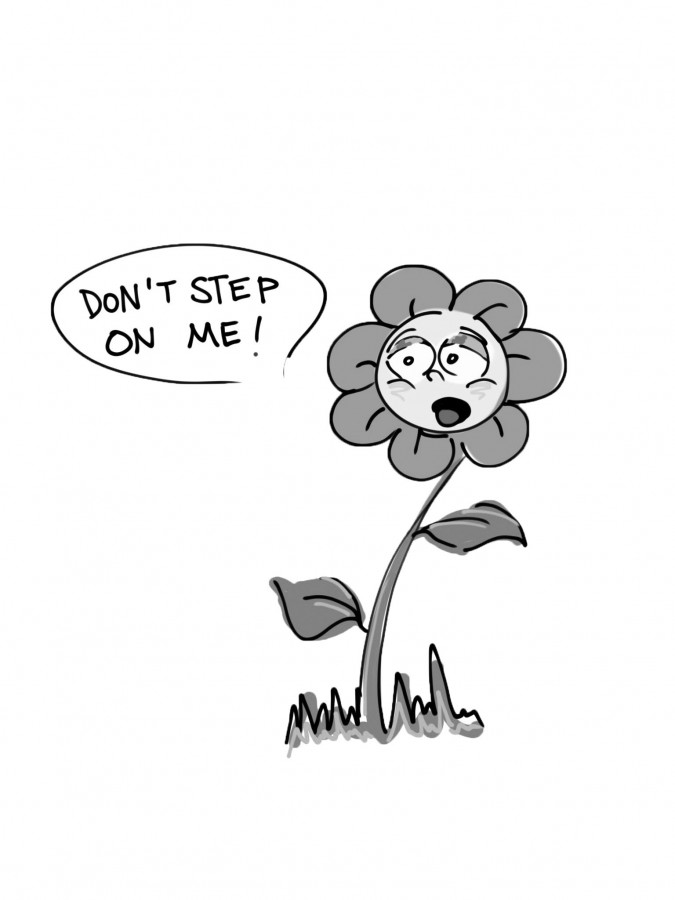It’s second semester, and we all have somehow managed to haul ourselves back to the desolate halls of Trinity Prep in an endless pursuit of intelligence. But what if we, the sleep-deprived Saints, are not the only intelligent beings to grace campus?
According to Merriam-Webster online dictionary, intelligence is defined as “the ability to learn or understand things or to deal with new or difficult situations.” By this definition, a new kingdom of organisms that has been overlooked in terms of smarts can, in fact, bear the title of intelligent: the plant kingdom.
How many times have you walked across the grass in the quad? How many times have you walked straight into a tree? Well, maybe that one’s just me. Nevertheless, these plants undergo a struggle to survive, just as humans do. In fact, a movement in the world of environmental science argues that plants should be considered intelligent.
The question of plant intelligence has floated around the scientific and philosophical communities since Ancient Greece, and it is backed up with substantial amounts of evidence. This claim stems from the fact that plants respond to external stimuli. For example, the mimosa pudica’s leaves curl inward when touched, and Venus flytraps become a deathbed to any unfortunate fly that lands on them. They are excellent at problem solving and they attract animals with colors and smells in order to ensure pollination.
However, these observations only just graze the surface of the argument for plant intelligence.
“In addition to hearing [and] taste, for example, [plants] can sense gravity, the presence of water, or even feel that an obstruction is in the way of its roots, before coming into contact with it,” writes Public Radio International in an article explaining prominent scientist Michael Pollan’s research.
It is very hard to compute that plants may be considered intelligent, especially because they don’t have brains. The topic remains highly controversial because of society’s typical idea of intelligence. Plants don’t know how to recognize the meter of poetry, or how to find the equilibrium price of a product based on a supply-demand graph. They probably don’t even know that the mitochondria is the powerhouse of their own cells. Yet, they can still be considered intelligent.
“So normally, [scientists and psychologists] tend to produce a definition of intelligence that is strictly limited to the human or high-level animals, like primates or something like that,” said Stefano Mancuso, a plant neurobiologist, in an interview with Salon. “It’s much more evolutionary-sounding. I think intelligence is a real principle of life — it’s something that you cannot survive without. So not just plants, but every living organism must be intelligent to survive.”
Not only are plants intelligent, but also some plant neurobiologists believe that “plants are conscious — not self-conscious, but conscious in the sense they know where they are in space,” Pollan said.
Whether or not you believe that plants’ instincts and survival tactics classify them as intelligent, they certainly fall under our accepted definition of intelligence. Let’s run with this and see how it would impact our society.
Is it possible that plants deserve rights? We have rights for humans laid out in the Constitution, and there are laws protecting animal rights etched into our legal system. These exist because nothing that is living deserves to be mistreated.
I’m not saying you can’t eat lettuce because you’ll make it cry gentle, helpless tears as it is murdered. Technically, their intelligence and consciousness forces plants to deserve some kind of legal protection. Simply based on society’s morals to protect all life, we are obligated to protect plants. This obligation is only intensified by the presence of intelligence and consciousness.
If rights are not granted to plants, could the absence of their rights be proof of a global hierarchy of intelligence? Do we put more value on a being based on its level of intelligence? If so, consider this: it can be argued that plants are smarter than babies. Plants always serve to keep themselves alive, while babies can’t even get rid of their own waste. Maybe they should try developing some stomata.
Further, if plants are conscious, then the future of vegetarian and vegan diets could take quite a turn. People who don’t want to eat other animals or beings would be faced with a moral dilemma: abandon their ideals, survive off of animal products or become an aquatarian. Water is the only thing vegans would be able to consume, taking the juice-cleanse trend to a whole new level.
Actually, vegans could also survive on synthetically-created fruits and vegetables. When plants are intelligent, however, synthetically producing such food could be considered cloning, and then the ethics debate of cloning becomes an issue. It might be easier to become an aquatarian.
In spite of their magnitude, these views about protecting plants do not have a strong effect on vegetarians and vegans: “Plants are immobile, and therefore do not need personal space,” said Ayla Maugans, an ex-vegan who is now a pescatarian. “Quality care can be easily provided for [plants] with proper soil, water and fertilization. Besides, people have to eat something to survive and it seems at this point in time that eating plants causes the least amount of harm.”
No matter what our world concludes about the rights of plants, one thing is certain: plants are intelligent and can be considered conscious. So the next time you want to walk across the quad, perhaps you should stick to the sidewalk. The crunching of the grass under your shoe could be more than just noise; it could be the grass’s way of screaming. Showing a little photosympathy by walking around will help combat the root of the problem, and the grass will be forever grateful.











